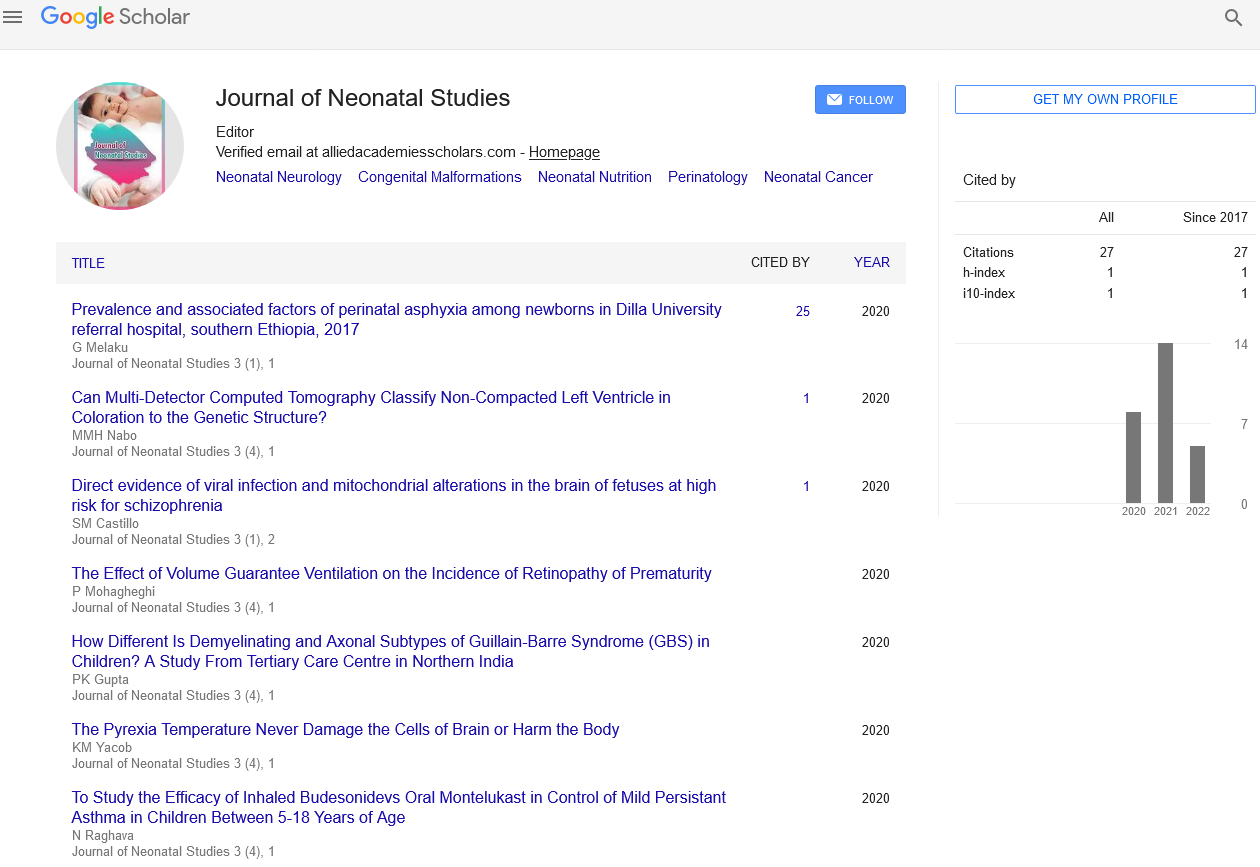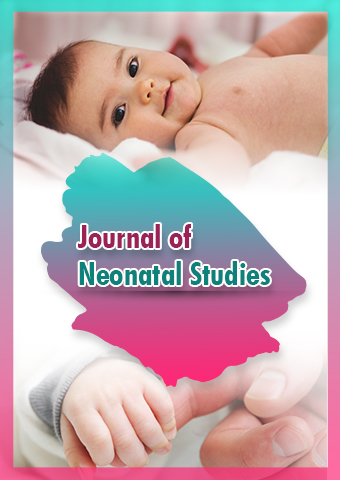Commentary - Journal of Neonatal Studies (2024) Volume 7, Issue 1
Neonatal Medicine: Nurturing Precious Beginnings
- Corresponding Author:
- Xiao Catho
Department of Neonatology, university of geneva, Switzerland
E-mail: Xcatho@hge.ch
Received: 08-Jan-2024, Manuscript No. JNS-24-124910; Editor assigned: 10-Jan-2024, PreQC No. JNS-24-124910 (PQ); Reviewed: 25-Jan-2024, QC No. JNS-24-124910; Revised: 05-Feb-2024, Manuscript No. JNS-24-124910 (R); Published: 13-Feb-2024, DOI: 10.37532/JNS.2024.7(1).173-174
Description
Neonatal medicine, also known as neonatology, is a specialized branch of pediatrics dedicated to the comprehensive care of newborns, particularly those born prematurely or with medical conditions requiring specialized attention. This field has witnessed remarkable progress over the years, driven by advances in medical research, technology, and evolving healthcare practices. Neonatal medicine plays a pivotal role in addressing the unique healthcare needs of newborns, ensuring their survival, and fostering healthy development. In this article, we will explore the intricacies of neonatal medicine, from the challenges it addresses to the latest advancements that have transformed the landscape of caring for the tiniest lives.
Prematurity and neonatal care
A critical aspect of neonatal medicine revolves around the challenges posed by premature births, defined as births occurring before 37 weeks of gestation. Premature infants often face complex health issues due to underdeveloped organs and systems, necessitating specialized care. Neonatologists, experts in neonatal medicine, play a pivotal role in providing this specialized care, particularly in Neonatal Intensive Care Units (NICUs). These units are equipped with state-ofthe- art technology and staffed by highly trained healthcare professionals, creating an environment tailored to meet the unique needs of newborns requiring intensive medical attention.
Advancements in respiratory support
One of the significant breakthroughs in neonatal medicine lies in the area of respiratory support for premature infants. Respiratory Distress Syndrome (RDS) is a common complication in premature babies due to underdeveloped lungs. The advent of surfactant therapy has revolutionized the management of RDS. Surfactant, a substance naturally produced in the lungs, helps maintain the elasticity of the air sacs, preventing them from collapsing. Administering surfactant to premature infants has significantly improved their ability to breathe and survive.
Additionally, advancements in mechanical ventilation, including high-frequency ventilation, have provided neonatologists with more precise tools to support respiratory function in fragile newborns. These innovations collectively contribute to reducing the incidence of respiratory complications and improving overall outcomes for premature infants.
Nutritional support for premature infants
The nutritional needs of premature infants differ significantly from those born at full term. Neonatologists have access to specialized nutritional formulations tailored to meet the unique requirements of these tiny patients. Preterm infants often struggle with feeding due to underdeveloped suck and swallow reflexes. As a result, neonatal care teams employ various strategies, including the use of feeding tubes and carefully calibrated nutrition plans, to ensure that premature infants receive the essential nutrients necessary for growth and development.
The emphasis on providing optimal nutrition is not only crucial for immediate well-being but also for the long-term health of premature infants. Adequate nutrition during the neonatal period has been linked to improved neurodevelopmental outcomes and a reduced risk of long-term health issues.
Neonatal surgery
While many medical conditions in neonates can be managed with non-invasive interventions, there are instances where surgical procedures become necessary. Neonatal surgery is a specialized field that addresses congenital anomalies, structural abnormalities, and other conditions requiring surgical intervention in newborns.
Advancements in neonatal surgery techniques, anesthesia tailored for newborns, and post-operative care have significantly improved the success rates of surgical interventions. Common neonatal surgical procedures include the correction of congenital heart defects, repair of gastrointestinal anomalies, and treatment of conditions affecting the respiratory and urinary systems.
Challenges in neonatal medicine
While remarkable progress has been made in neonatal medicine, several challenges persist. Preterm birth rates remain a global concern, with factors such as socioeconomic disparities, maternal health, and access to quality healthcare influencing outcomes. Neonatal infections, particularly in the hospital setting, pose a significant risk to vulnerable infants, emphasizing the need for stringent infection control measures in NICUs.
Long-term neurodevelopmental outcomes are also a focus of ongoing research. Despite improvements in survival rates, there is a growing awareness of the potential neurodevelopmental challenges faced by preterm infants. Addressing these challenges requires a holistic approach, including early intervention programs and ongoing follow-up care.
Future directions in neonatal medicine
The landscape of neonatal medicine continues to evolve, with ongoing research paving the way for future advancements. Several areas of interest and exploration are shaping the future of neonatology.
Stem cell therapy: The potential use of stem cell therapy in neonatal medicine holds promise for regenerative medicine. Research is underway to explore the therapeutic benefits of stem cells in treating conditions such as hypoxic-ischemic encephalopathy and other neurological disorders in neonates.
Precision medicine: Tailoring medical interventions to the individual characteristics of each newborn is a growing area of interest. Precision medicine in neonatology involves identifying genetic and molecular factors that influence neonatal health, allowing for targeted and personalized treatment approaches.
Innovative technologies: Advancements in medical technology, including robotics and artificial intelligence, are being explored to enhance the precision and efficiency of neonatal care. From robotic-assisted surgeries to AI-driven diagnostic tools, these technologies have the potential to further improve outcomes for neonates.
Maternal health initiatives: Recognizing the intimate link between maternal health and neonatal outcomes, initiatives focused on improving maternal health are gaining prominence. Addressing maternal risk factors for preterm birth and promoting overall maternal well-being are crucial components of comprehensive neonatal care.
Global health initiatives: Bridging the gap in neonatal care disparities globally is a key focus. Initiatives aimed at improving access to quality healthcare, particularly in low-resource settings, are essential for reducing neonatal mortality rates and enhancing outcomes for newborns worldwide.
Neonatal medicine stands at the forefront of medical innovation and compassionate care, addressing the unique healthcare needs of the smallest and most vulnerable members of society. The progress made in this field reflects a collective commitment to nurturing the tiniest lives and ensuring that each newborn has the best possible start in life.
As neonatal medicine continues to advance, the collaboration of healthcare professionals, researchers, and policymakers becomes increasingly vital. By addressing challenges, embracing technological innovations, and prioritizing holistic, family-centered care, the field of neonatology will undoubtedly play a pivotal role in shaping the future of healthcare for newborns around the world. Every stride made in neonatal medicine brings us closer to a future where every infant, regardless of their initial challenges, can thrive and fulfill their potential.

